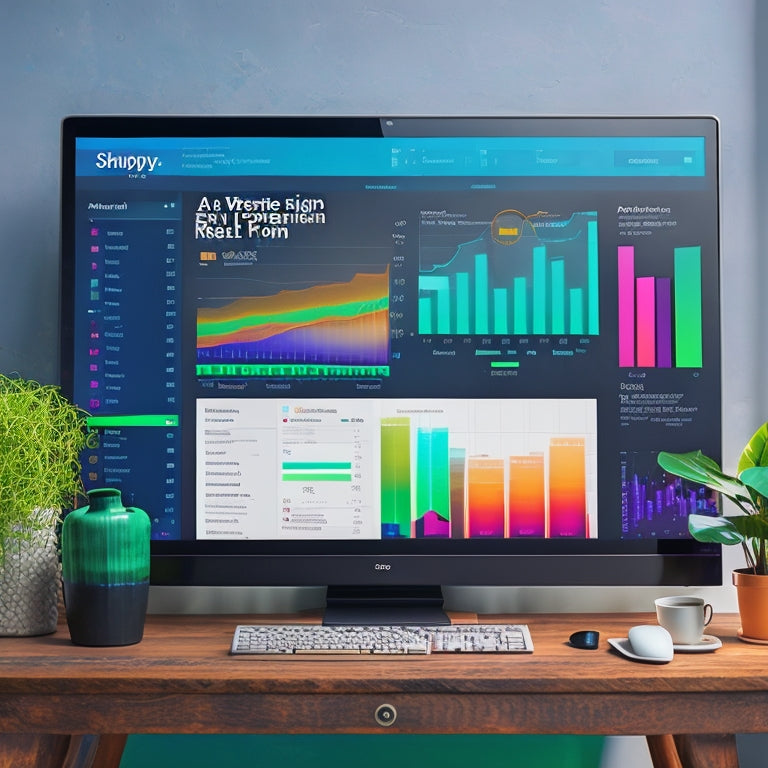
How Do I Improve SEO on My Shopify Website
Share
This article examines methods to enhance search engine optimization (SEO) on Shopify websites.
It begins by discussing the benefits of implementing SEO strategies on Shopify platforms.
Subsequently, it offers practical tips for optimizing SEO on Shopify websites, covering various aspects such as keyword research, on-page optimization, and link building.
Additionally, the article provides a collection of tutorials and resources to aid in further understanding and implementation of effective SEO practices for Shopify websites.
By following these recommendations, Shopify website owners can improve their online visibility and attract more organic traffic.
- Use meta tags and descriptions to improve visibility in search results
- Optimize keywords throughout the website for higher search rankings
- Ensure a mobile-friendly website design for a seamless user experience
- Conduct keyword research to identify relevant and high-volume keywords
Benefits of SEO for Shopify Websites
This discussion will focus on the benefits of implementing SEO strategies on Shopify websites.
By optimizing the website for search engines, businesses can experience increased website traffic and higher search rankings.
Additionally, SEO practices can lead to improved user experience, boosted online visibility, and ultimately, the potential for increased sales.
Increased Website Traffic
An effective strategy to increase website traffic on a Shopify website involves optimizing keywords to improve search engine rankings. By incorporating relevant keywords throughout your website content, meta tags, and product descriptions, you can attract more organic traffic from search engines. This increased visibility can lead to higher click-through rates and ultimately improved conversion rates.
Additionally, implementing effective content marketing strategies can also drive more traffic to your Shopify website. Creating high-quality, informative, and engaging content that resonates with your target audience can help establish your brand as an authority in your industry and drive more organic traffic to your website.
Higher Search Rankings
Implementing effective strategies to optimize keywords and enhance website content can contribute to achieving higher search engine rankings.
One important aspect to consider is improving site structure. By organizing the website's pages and URLs in a logical and hierarchical manner, search engines can easily navigate and understand the content. This can be done by creating a clear navigation menu, using descriptive page titles and headings, and implementing internal linking.
Another factor that can impact search rankings is optimizing page speed. Slow loading websites can result in a poor user experience, leading to higher bounce rates and lower search rankings. To improve page speed, it is recommended to optimize image sizes, minimize unnecessary code, and leverage browser caching.
Improved User Experience
Improving user experience on a website is crucial for enhancing engagement and encouraging return visits.
One key aspect of improving user experience is through improved site navigation. By ensuring that the website's navigation is intuitive and easy to use, visitors can quickly find the information or products they are looking for, leading to a more positive experience.
Another important factor is optimizing page loading speed. Slow loading times can frustrate users and lead to high bounce rates. By optimizing the website's performance and reducing the loading time, visitors are more likely to stay on the site and explore further.
These improvements in site navigation and page loading speed contribute to a better user experience, increasing engagement and the likelihood of return visits.
Boosted Online Visibility
Enhancing online visibility is essential for increasing the reach and exposure of a website to a wider audience. One effective way to boost organic traffic and improve online visibility is by optimizing product descriptions.
Product descriptions play a crucial role in attracting potential customers and providing them with relevant information about the product. By using targeted keywords in the product descriptions, it becomes easier for search engines to understand the content and rank the website higher in search results.
Additionally, well-crafted product descriptions that are informative, concise, and keyword-focused can also improve the user experience, as they provide valuable information to potential customers.
Optimizing product descriptions is an important aspect of SEO strategy that can significantly enhance online visibility and drive more organic traffic to a website.
Potential for Increased Sales
Maximizing potential for increased sales can be achieved by strategically optimizing product descriptions to effectively communicate the value and benefits of the products to potential customers. To achieve this, it is essential to implement effective SEO strategies that improve online visibility and increase conversion rates.
Effective SEO strategies involve incorporating relevant keywords into product descriptions, titles, and meta tags to ensure that the website appears in search engine results for relevant queries. By optimizing product descriptions with targeted keywords, the website becomes more discoverable to potential customers, resulting in increased traffic and ultimately higher conversion rates.
Additionally, compelling and persuasive product descriptions that highlight the unique selling points, features, and benefits of the products can further enhance the potential for increased sales.
SEO Tips for Shopify Websites
This discussion will focus on important SEO techniques for Shopify websites.
One crucial technique is the use of meta tags and descriptions. These play a crucial role in helping search engines understand the content of a webpage. By including relevant keywords and a concise description of the page's content, you can improve its visibility in search results.
Another technique is keyword optimization. This involves strategically placing relevant keywords throughout the website. By doing this, you can improve the website's chances of ranking higher in search results when users search for those keywords.
Having a mobile-friendly website design is also essential. With more and more users accessing websites through mobile devices, it is crucial to ensure that your website is responsive and provides a seamless user experience on different screen sizes.
Meta Tags and Descriptions
Meta tags and descriptions provide important information about the content of a webpage, facilitating search engine optimization for Shopify websites. Meta tags are HTML elements that provide search engines with metadata about a webpage. They play a crucial role in determining how search engines perceive and rank a website. Including relevant keywords in meta tags can improve a website's visibility in search engine results.
Meta descriptions, on the other hand, are snippets of text that describe the content of a webpage. They provide a concise summary that appears in search engine results pages, influencing users' decision to click on a particular link. To write effective meta descriptions, it is important to use compelling language, include relevant keywords, and keep the description within the recommended character limit.
Keyword Optimization Techniques
Keyword optimization techniques involve conducting thorough research to identify high-volume and relevant keywords. This includes strategically incorporating them into webpage content and ensuring they are used naturally and contextually. This helps enhance search engine visibility and improve website rankings.
On-page optimization is an important aspect of keyword optimization. It involves optimizing various elements such as titles, headings, meta tags, and URLs to include targeted keywords. This helps search engines understand the content on the webpage and improves the chances of higher rankings.
Link building strategies also play a significant role in keyword optimization. By acquiring high-quality backlinks from authoritative websites, the credibility and authority of the website increase. This, in turn, leads to higher search engine rankings.
Effective keyword optimization techniques, combined with on-page optimization and link building strategies, can greatly improve SEO and drive organic traffic to a Shopify website.
Mobile-Friendly Website Design
Mobile-friendly website design is essential for ensuring optimal user experience and accommodating the increasing number of users accessing websites on mobile devices.
With the rise of smartphones and tablets, it has become imperative for businesses to adapt their websites to be responsive and mobile-optimized. Responsive design allows websites to automatically adjust their layout and content based on the screen size and resolution of the device being used. This ensures that the website is easily readable and navigable, regardless of the device being used.
Mobile optimization involves optimizing the loading speed, reducing unnecessary elements, and improving the overall performance of the website on mobile devices.
High-Quality Backlink Building
High-quality backlink building is a crucial aspect of website optimization, as it enhances the credibility and authority of a website, improves search engine rankings, and increases organic traffic.
One effective method for generating backlinks is through guest blogging. Guest blogging involves writing and publishing articles on other websites within the same niche, which allows you to include a backlink to your website in the author bio or within the content itself. This not only increases your website's visibility but also establishes you as an expert in your field.
Another strategy is to form influencer partnerships, where you collaborate with influential individuals or brands in your industry. This can involve creating content together, promoting each other's products or services, or participating in joint events. These partnerships can significantly boost your backlink profile and drive more traffic to your website.
Helpful Tutorials for Shopify SEO
One useful resource for learning about optimizing SEO on Shopify websites is a collection of informative tutorials specifically tailored to addressing SEO challenges on the Shopify platform. These tutorials provide step-by-step guidance on implementing effective SEO strategies for Shopify.
By following these tutorials, website owners can learn how to optimize their online stores to improve their visibility in search engine results. The tutorials cover various aspects of SEO, such as keyword research, on-page optimization, link building, and content creation. They also provide insights into technical SEO aspects, including site structure and URL optimization.
With the help of these tutorials, Shopify users can gain a comprehensive understanding of SEO best practices and apply them to their websites, ultimately increasing their organic search rankings and driving more traffic to their online stores.
Learn More: SEO Resources for Shopify Websites
A valuable resource for expanding knowledge on optimizing SEO for Shopify websites is a curated collection of resources that offer in-depth insights and practical guidance on various aspects of SEO strategies tailored specifically for the Shopify platform.
These resources provide a wealth of information on SEO tools that can be used to maximize the visibility and ranking of Shopify websites.
They also delve into the importance of on-page optimization techniques, which involve optimizing individual web pages to improve their relevance and visibility in search engine results.
Through these resources, users can gain a deeper understanding of how to effectively implement on-page optimization strategies such as keyword research, meta tags optimization, and URL structure optimization.
Frequently Asked Questions
How Long Does It Take for SEO Improvements to Show Results on My Shopify Website?
Measuring the effectiveness of SEO improvements on a Shopify website varies depending on factors such as the competitiveness of the keywords, the quality and quantity of content, the website's domain authority, and the effectiveness of the implemented strategies.
Can I Do SEO Myself or Do I Need to Hire a Professional for My Shopify Website?
The decision to DIY or hire professionals for SEO on a Shopify website depends on individual circumstances, including cost and benefits. Evaluating the resources, expertise, and time available is crucial in determining the most effective approach.
Are There Any Specific SEO Techniques That Work Best for Shopify Websites?
Effective SEO techniques for Shopify websites include conducting thorough keyword research to find the most relevant and high-performing keywords. Additionally, implementing strategies for link building can help improve search engine rankings by obtaining high-quality backlinks.
How Can I Optimize the Product Descriptions on My Shopify Website for Better Seo?
Optimizing product descriptions on a Shopify website for better SEO involves incorporating relevant keywords, using concise and informative language, and following SEO techniques specific to Shopify. This improves search engine visibility and increases organic traffic to the website.
What Are Some Common SEO Mistakes to Avoid When Optimizing a Shopify Website?
Common SEO mistakes to avoid when optimizing a Shopify website include lack of keyword research, improper use of meta tags, poor site structure, slow loading speed, and neglecting mobile optimization. Following Shopify SEO best practices can help prevent these errors.
Related Posts
-
Unlocking the Power of Topical Authority in SEO
Topical authority is a critical factor in the world of Search Engine Optimization (SEO), as it determines the trustw...
-

What Is a Search and Discovery App in Shopify
This article aims to provide a comprehensive understanding of the concept of a search and discovery app in the conte...
-

What Are Shopify's Competitive Advantages
Shopify, a leading e-commerce platform, possesses a range of competitive advantages that contribute to its prominenc...

